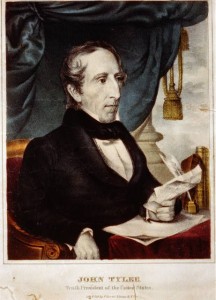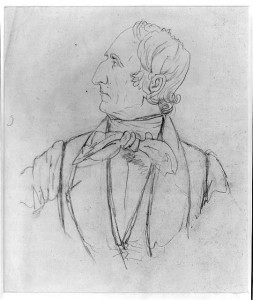150 years ago today John Tyler, the tenth president of the United States died in Richmond. Although approaching his 72nd birthday, he was still working as a representative from Virginia in the Confederate Congress. The obituary in the Richmond Daily Dispatch of January 20, 1862 focused on Tyler’s devotion to States’ Rights:
Death of John Tyler.
Saturday’s telegraph heralded through the South the most afflicting intelligence it has borne since the birth of our new Republic. It announced the demise of a great and good man, whom our people loved, venerated, and trusted, probably to an extent greater than any of her statesmen. If ever a country or cause could boast its “representative man,” surely here was the person to whom the South could point as here, not only as presenting an admirable type of the Southern gentleman in all the domestic and social relations of that beautiful character, but as a statesman so imbued with the instincts and principles of Southern politics, that none ever could or ever did doubt for a moment, in any public emergency or at any crisis, where John Tyler stood.
Long connected with public affairs, and mingling in the strifes of parties and the contentions of men, he never lost his character or incurred an instant’s suspicion as a State-Rights man. His father before him, one of the wisest and most honored of the Revolutionary sages, had signalized his devotion to State independence by voting in the Virginia Convention of 17SS [1788] with that large, that immortal majority, which resisted the ratification of the Federal Constitution — not that he opposed the scheme of Union, but that he distrusted the nationalism which lay covert in that instrument, and which, as we have since found, by its silent machinations, has undermined the power of more than half the States, and now, throwing off all disguise, is with terrible bloodthirstiness seeking, by armies and confiscations, to subjugate the rest. …
We come down to the crisis which has sundered the Union and enveloped the South in the perils and horrors of war. Had there been any return from that bourne which is entered through the portals of the grave, what a host of the great Southern dead would have rushed back to take part for their country in the bloody drama now transpiring, and which many of them so vividly foresaw! There was one man belonging to a by-gone generation who had not yet passed the inexorable portals, and whom these solemn events startled from his retirement. Though past the allotted three score years and ten, Mr. Tyler again appeared upon the stage of public affairs in February last as a member of the Virginia Convention. His course in that body and in the Peace Congress convened at Washington in the same month, is familiar to the people of the South. It was marked by the same fidelity to the creed of State-Rights and State sovereignty which had signalized his previous career, and by that brilliancy of intellect which great occasions seemed always to evoke from him.
His celebrated speech in answer to, and in exposure and annihilation of, George W. Summers, was probably one of the ablest of his life, as it was one of the most powerful of the many which the present times have called forth. His election to Congress last November in the district embracing the Capital of the Confederacy, over competitors of conceded talents and popularity, attested the high appreciation in which the people held his last services to his country.
He died last Saturday morning, at his rooms in the Ballard House. He had been suddenly stricken down by disease on the Sunday morning before, while sitting at the public breakfast table, surrounded by his charming and affectionate family. He had reached the age of seventy-one years, ten months and nineteen days, having been born on the 29th March, 1790. He fell with harness on, at the post of duty, in the midst of arduous service full of honors and full of years. But for his extreme age, he was endowed with precisely the qualities of heart, of head and of principle, which must have secured for their possessor the supreme honors of the new Confederacy.


